译林牛津版七年级英语上Unit 7 welcome to this unit 共30张PPT
牛津译林版初一英语7上 Unit 7 课时作业(word版,无答案,共6课时)
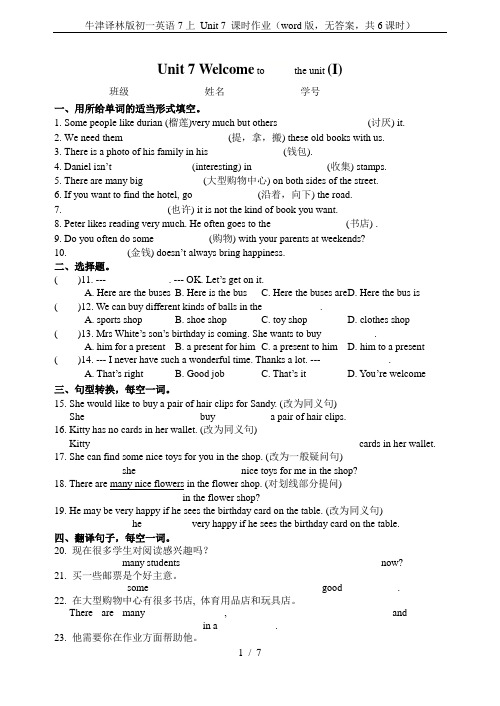
Unit 7 Welcome to the unit (I)班级______________ 姓名______________ 学号______________一、用所给单词的适当形式填空。
1. Some people like durian (榴莲)very much but others _________________ (讨厌) it.2. We need them ____________________ (提,拿,搬) these old books with us.3. There is a photo of his family in his ______________ (钱包).4. Daniel isn’t _______________ (interesting) in ______________ (收集) stamps.5. There are many big ___________ (大型购物中心) on both sides of the street.6. If you want to find the hotel, go ____________ (沿着,向下) the road.7. ____________________ (也许) it is not the kind of book you want.8. Peter likes reading very much. He often goes to the ______________ (书店) .9. Do you often do some __________ (购物) with your parents at weekends?10. ___________ (金钱) doesn’t always bring happiness.二、选择题。
( )11. --- ____________. --- OK. Let’s get on it.A. Here are the busesB. Here is the busC. Here the buses areD. Here the bus is ( )12. We can buy different kinds of balls in the ___________.A. sports shopB. shoe shopC. toy shopD. clothes shop ( )13. Mrs White’s son’s birthday is coming. She wants to buy __________.A. him for a presentB. a present for himC. a present to himD. him to a present ( )14. --- I never have such a wonderful time. Thanks a lot. --- _____________.A. That’s rightB. Good jobC. That’s itD. You’re welcome三、句型转换,每空一词。
牛津译林版英语七上Unit7《Shopping》(Welcometotheunit)英文说课稿1

牛津译林版英语七上Unit 7《Shopping》(Welcome to the unit)英文说课稿1一. 教材分析《牛津译林版英语七上Unit 7 Shopping》是按照新的课程标准编写的一篇实用性强的教科书。
本单元的主题是购物,主要讨论在购物时可能会用到的一些日常用语和交际用语。
通过学习本单元,学生可以掌握购物场景下的基本词汇和句型,提高在实际生活中的英语口语表达能力。
二. 学情分析初中的学生已经掌握了一定的英语基础知识,对于日常的英语交流已经没有太大的问题。
但是,他们在口语表达方面还存在一定的困难,尤其是在一些特定的场景下,比如购物。
因此,我们需要通过一些特定的教学方法来帮助他们更好地掌握这些知识。
三. 说教学目标1.知识目标:通过学习,学生能掌握购物场景下的基本词汇和句型,理解对话内容。
2.能力目标:通过实践,学生能熟练运用所学知识,进行购物场景的模拟交流。
3.情感目标:通过学习,学生能提高对英语学习的兴趣,增强自信心。
四. 说教学重难点1.重点:购物场景下的基本词汇和句型的掌握。
2.难点:对购物场景下的一些特殊用语的理解和运用。
五. 说教学方法与手段1.教学方法:采用任务型教学法,让学生在实际操作中掌握知识。
2.教学手段:利用多媒体课件,为学生提供丰富的视觉和听觉材料。
六. 说教学过程1.热身(5分钟):通过播放一段购物场景的视频,引起学生的兴趣,并复习一些相关的词汇。
2.课堂导入(10分钟):介绍本节课的主题,展示本节课要学习的内容,让学生明白学习的目标。
3.课堂讲解(20分钟):通过讲解和示范,让学生掌握购物场景下的基本词汇和句型。
4.课堂实践(15分钟):学生分组进行角色扮演,模拟购物场景,运用所学知识进行交流。
5.课堂总结(5分钟):对所学内容进行总结,强调重点和难点。
七. 说板书设计板书设计要清晰、简洁,能够一目了然地展示本节课的主要内容和关键信息。
可以采用列表或者图示的形式,将购物场景下的基本词汇和句型展示出来。
牛津译林版七年级英语上册Unit 7 课件
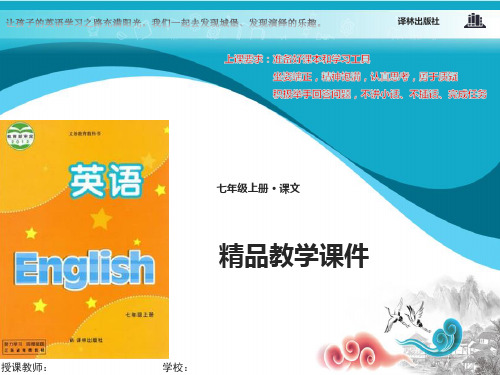
(After trying it on) S: It _fi_ts_(合身)you well./ It _m__a_tc_h_e_s_ (和…相配) your
white shirt well.
M: How much does it cost?/How much is it?
/What’s the price of it?
enough wait(ing) bookshop
poor
地区,区域
area
尺寸,大小
size
合脚,合身
fit
便宜的
cheap
牛仔裤
jeans
大的
large
笔记,便条,注释 note
收集
collect
也许
maybe
口袋
零头
change
邮票
stamp
Some phrases
• 想让你和我一起去购物
finish the task.
match 匹配 A matches B well eg. This tie matches the shirt well. fit 适合, 合身=be fit for eg. This pair of shoes fits me well.
The bright red __C___ the peaceful white well. A. match B. fit C. matches D. fits
• 3.This basketball is very __e_x_p_e_ns(ivceosting a lot of money).
• 4.My cousin has __e_n_o_u_g_h_(as much as one wants or needs) time to watch TV every day.
Unit7grammar课件牛津译林版英语七年级上册
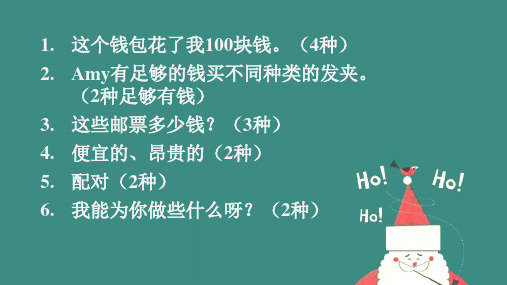
(question)
We need some juice. 否定句: We don’t need any juice. 疑问句: Do you need any juice?
在表示请求或征求意见的疑问句中希望 得到对方的肯回答时,通常用some.
Would you like some juice? (建议) Can I have some hamburgers? (请求)
• Is there an orange on the table? • Is there any juice on the table? • Are there any bananas on the table?
No, there isn’t. Yes, there is. Yes, there are.
Talk about your dream shop. What do you have in your dream shop?
There is/are…
There are two cats and a dog in the picture. There is a dog and two cats in the picture.
1. 这个钱包花了我100块钱。(4种) 2. Amy有足够的钱买不同种类的发夹。
(2种足够有钱) 3. 这些邮票多少钱?(3种) 4. 便宜的、昂贵的(2种) 5. 配对(2种) 6g
Grammar
Let’s have a Christmas party !
6. There are three kilos of pork in the shopping bag. (对划线部分提问) _H_o_w_ _m_u__ch_ pork _is__ there in the shopping bag?
牛津译林版初中七年级英语上册 《Welcome to our school》

twentyminutes
-Howdoyougettoschool? Igettoschoolbybike. Howlongdoesittake? Ittakesmehalfanhour.
onfoot
halfanhour
Howdoeshe/shegetto…? He/Shegetsto…by…. Howlongdoesittake? Ittakes….
Integratedskills
Unit3Welcometoourschool
-Howdoyougettoschool? Igettoschoolbybike. Howlongdoesittake? Ittakesmeanhour.
bybike
anhour
-Howdoyougettoschool? Igettoschoolbybus. Howlongdoesittake? Ittakesmetwentyminutes.
4. -Howdoyougetto…? 你怎样到……? -Igetto…by…. 我乘……到…… e.g.-HowdoyougettoNanjing. -IgettoNanjingbytrain. 5. -Doyouhavea/an…? -Yes, Ido. /No, Idon’t. e.g. -Doyouhavealibraryatschool? -Yes, Ido.
7. walktosp. =gotosp. onfoot步行去某地 8. beopen开着的 9. allkindsof各种各样的 e.g. Thereareallkindsofbooksinthe library. 10. borrow…from…向……借…… e.g. Wecanborrowbooksfromthe library. Iborrowsomemoneyfromhim.
Unit7重点知识点2021-2022学年牛津译林版英语七年级上册
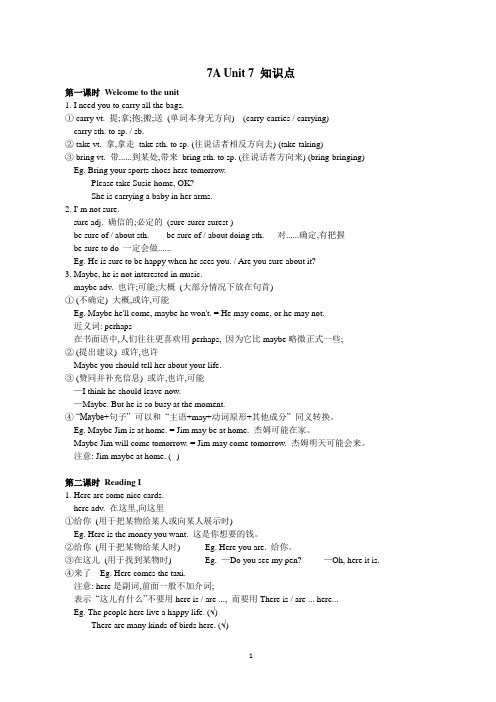
7A Unit 7 知识点第一课时Welcome to the unit1. I need you to carry all the bags.① carry vt. 提;拿;抱;搬;送(单词本身无方向) (carry-carries / carrying)carry sth. to sp. / sb.② take vt. 拿,拿走take sth. to sp. (往说话者相反方向去) (take-taking)③ bring vt. 带......到某处,带来bring sth. to sp. (往说话者方向来) (bring-bringing) Eg. Bring your sports shoes here tomorrow.Please take Susie home, OK?She is carrying a baby in her arms.2. I' m not sure.sure adj. 确信的;必定的(sure-surer-surest )be sure of / about sth. be sure of / about doing sth. 对......确定,有把握be sure to do 一定会做......Eg. He is sure to be happy when he sees you. / Are you sure about it?3. Maybe, he is not interested in music.maybe adv. 也许;可能;大概(大部分情况下放在句首)① (不确定) 大概,或许,可能Eg. Maybe he'll come, maybe he won't. = He may come, or he may not.近义词: perhaps在书面语中,人们往往更喜欢用perhaps, 因为它比maybe略微正式一些;② (提出建议) 或许,也许Maybe you should tell her about your life.③ (赞同并补充信息) 或许,也许,可能—I think he should leave now.—Maybe. But he is so busy at the moment.④“Maybe+句子”可以和“主语+may+动词原形+其他成分”同义转换。
牛津译林版七年级上册 Unit7 单元知识点讲解

- Sure. Here it is./Here you are.当然可以,给你。
Maybe she is right.=She may be right.也许她是对的。
Maybe he likes the food here.=He may like the food here.也许他喜欢这儿的食物。
②Maybe Tom sings well.同义句转换
Tom______________well.
- What about practising playing the piano?练习弹钢琴怎么样?
- That's a good idea.这是个好主意。
( )- Let's go fishing this Sunday afternoon, shall we?–_______.
A. That's a good ideaB.You're welcome
探究点:enough在此用作_______词,意为“_______”。
[指点迷津] enough在此用作代词,意为“足够(的)”。
Two days is enough.
两天的时间足够了。
[知识拓展] (1)enough用作限定词修饰名词时可以放在名词之前也可放在名词之后,如要表示强调则放在名词之前。
C. You're rightD.Thank you
Reading
1.Can I help you?
要我帮您吗?/您要买什么?
2014牛津译林版七年级上Unit7 shopping Comic strip~Welcome to the unit课件

Studying aims
3.To care for each other and get along well with each other. (彼此关心、相处融洽。)
Put the following phrases or sentences into English.
1给他买一些邮票
buy him some stamps / buy some stamps for him like collecting stamps be interested in music
Show 4
Can you explain the language points to us?
智者善于动脑, 勇者敢于展示!
some names of shops
bookshop, clothes shop, flower shop, shoe shop, toy shop, supermarket, gift shop, sports shop down the street come with me like collecting stamps You’re welcome.
1.Does Eddie want to go shopping with Hobo? No, he doesn’t . 2.Why does Hobo ask Eddie to go with him? Because he needs Eddie to carry all the bags.
Show3
need you to carry all the bags Here’s my wallet. buy sb. sth.=buy sth. for sb. I’m not sure.
be interested in …
牛津译林版七年级英语上册Unit7语法知识点汇总
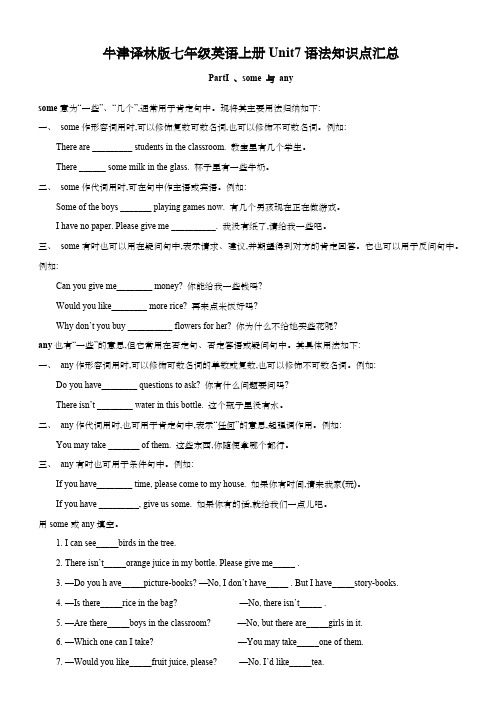
牛津译林版七年级英语上册Unit7语法知识点汇总PartI 、some 与anysome意为“一些”、“几个”,通常用于肯定句中。
现将其主要用法归纳如下:一、some作形容词用时,可以修饰复数可数名词,也可以修饰不可数名词。
例如: There are _________ students in the classroom. 教室里有几个学生。
There ______ some milk in the glass. 杯子里有一些牛奶。
二、some作代词用时,可在句中作主语或宾语。
例如: Some of the boys _______ playing games now. 有几个男孩现在正在做游戏。
I have no paper. Please give me __________. 我没有纸了,请给我一些吧。
三、some有时也可以用在疑问句中,表示请求、建议,并期望得到对方的肯定回答。
它也可以用于反问句中。
例如: Can you give me________ money? 你能给我一些钱吗? Would you like________ more rice? 再来点米饭好吗? Why don’t you buy __________ flowers for her? 你为什么不给她买些花呢?any也有“一些”的意思,但它常用在否定句、否定答语或疑问句中。
其具体用法如下:一、any作形容词用时,可以修饰可数名词的单数或复数,也可以修饰不可数名词。
例如: Do you have________ questions to ask? 你有什么问题要问吗? There isn’t ________ water in this bottle. 这个瓶子里没有水。
二、any作代词用时,也可用于肯定句中,表示“任何”的意思,起强调作用。
例如: You may take _______ of them. 这些东西,你随便拿哪个都行。
牛津译林七年级上册英语Unit 3 Welcome to the unit知识点总结讲解
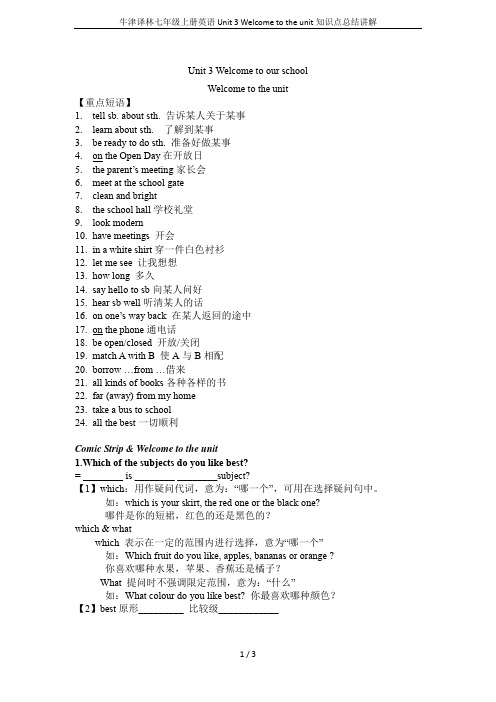
Unit 3 Welcome to our schoolWelcome to the unit【重点短语】1.tell sb. about sth. 告诉某人关于某事2.learn about sth. 了解到某事3.be ready to do sth. 准备好做某事4.on the Open Day在开放日5.the parent’s meeting家长会6.meet at the school gate7.clean and bright8.the school hall学校礼堂9.look modern10.have meetings 开会11.in a white shirt穿一件白色衬衫12.let me see 让我想想13.how long 多久14.say hello to sb向某人问好15.hear sb well听清某人的话16.on one’s way back 在某人返回的途中17.on the phone通电话18.be open/closed 开放/关闭19.match A with B 使A与B相配20.borrow …from …借来21.all kinds of books各种各样的书22.far (away) from my home23.take a bus to school24.all the best一切顺利Comic Strip & Welcome to the unit1.Which of the subjects do you like best?= ________ is ________ ________subject?【1】which:用作疑问代词,意为:“哪一个”,可用在选择疑问句中。
如:which is your skirt, the red one or the black one?哪件是你的短裙,红色的还是黑色的?which & whatwhich 表示在一定的范围内进行选择,意为“哪一个”如:Which fruit do you like, apples, bananas or orange ?你喜欢哪种水果,苹果、香蕉还是橘子?What 提问时不强调限定范围,意为:“什么”如:What colour do you like best? 你最喜欢哪种颜色?【2】best原形_________ 比较级____________练习:1.你更喜欢哪个,茶还是果汁?_____________________________________2.--Can you give the chair ____me?--____________?A. for;Which chairB. to; Which oneC. with; Where are2.So I can eat three.①so[conj.]因此,所以(不能和because同时出现)②so[adj.]如此的so big 如此多的人_________________如此多的作业___________________③so[adv.](表示程度)这样,如此I think so. / I hope so. / I am afraid so.【拓展】so…that…如此…以至于…这个箱子如此重,我搬不动。
牛津译林版英语七上unit7单元复习及习题

译林7A英语UNIT 7单元知识点归纳及练习题Unit 7一、词汇知识点整理:need you to carry all the bags 需要你来拎所有的包shoe shop 鞋店clothes shop服装店sports shop 体育用品商店flower shop 花店gift shop 礼品店toy shop 玩具店talk about presents谈论礼物ask sb for help 向某人求助I am not sure. 我不确定be interested in 对……感兴趣like collecting stamp喜欢集邮want some football cards想要一些足球卡片Just a minute./ wait for a short time请稍等Take/Have a look. 看一下different kinds of hair clips不同种类的发夹match her pink coat配他的粉红外套some other nice things一些其他好东西not far away from my school离我学校不远enough snacks足够多的零食the children in poor areas贫困地区的孩子们learn a lot from books从书中学到很多it is a long way很长一段路most of the children大多数孩子walk a long way to school走很长一段路到校use our pocket money to buy them these things用我们的零花钱买这些东西try them on试穿他们fit very well 很合适foods from different areas 来自不同地区的食物二、结构用法:buy sth for sb =buy sb sth 给某人买某物plan to do sth 计划做某事三、句式用法:The mall is a good place to meet friends and have fun. 这个购物中心是见朋友和玩的开心的好地方。
Unit7知识点和考点2022-2023学年牛津译林版七年级英语上册
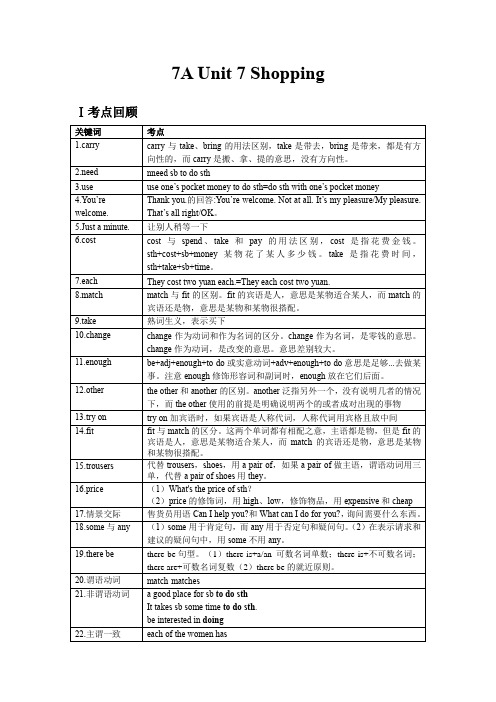
7A Unit 7 Shopping Ⅰ考点回顾Ⅱ考点讲解1.I need you to carry all the bags.(1)carry的基本含义做及物动词,意思是搬,拿,提。
(2)carry的核心考点之一考察carry与take、bring的用法区别,take是带去,bring是带来,都是有方向性的,而carry是搬、拿、提的意思,没有方向性。
(3)carry的核心考点之二考察carry的三单形式,因为carry的三单形式是不规则的。
carry 是以辅音+y结尾的单词,其三单形式为去y改i加es,即carries。
1. Wow, how strong the little boy is! He can the heavy box by himself.A.takeB. bringC. carryD. have答案C2.I need you to carry all the bags.(1)need的基本含义作实义动词,意思是需要。
(2)need的核心考点之一考察need sb to do sth,意思是需要某人做某事。
her.A. to look afterB. looking afterC. looks afterD. look after答案A3.We can use our pocket money to buy them these things.(1)use one’s pocket money to do sth 意思是用某人的零用钱去做什么事,其同义词组为do sth with one’s pocket money.3. —How can we help the children in poor areas?—We can ______________ our pocket money to buy them some school things.A. spendB. takeC. costD. use答案D4.You’re welcome.(1)You’re welcome.的核心考点作为thank you的回答方式之一,其他的方式有Not at all. It’s my pleasure/My pleasure. That’s all right/OK。
Unit7知识点 牛津译林版英语七年级上册
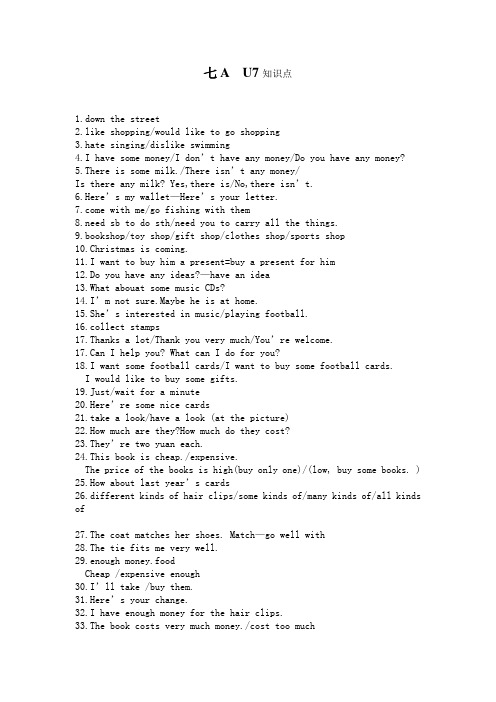
七A U7知识点1.down the street2.like shopping/would like to go shopping3.hate singing/dislike swimming4.I have some money/I don’t have any money/Do you have any money?5.There is some milk./There isn’t any money/Is there any milk? Yes,there is/No,there isn’t.6.Here’s my wallet—Here’s your letter.e with me/go fishing with them8.need sb to do sth/need you to carry all the things.9.bookshop/toy shop/gift shop/clothes shop/sports shop10.Christmas is coming.11.I want to buy him a present=buy a present for him12.Do you have any ideas?—have an idea13.What abouat some music CDs?14.I’m not sure.Maybe he is at home.15.She’s interested in music/playing football.16.collect stamps17.Thanks a lot/Thank you very much/You’re welcome.17.Can I help you? What can I do for you?18.I want some football cards/I want to buy some football cards.I would like to buy some gifts.19.Just/wait for a minute20.Here’re some nice cards21.take a look/have a look (at the picture)22.How much are they?How much do they cost?23.They’re two yuan each.24.This book is cheap./expensive.The price of the books is high(buy only one)/(low, buy some books. )25.How about last year’s cards26.different kinds of hair clips/some kinds of/many kinds of/all kinds of27.The coat matches her shoes. Match—go well with28.The tie fits me very well.29.enough money.foodCheap /expensive enough30.I’ll take /buy them.31.Here’s your change.32.I have enough money for the hair clips.33.The book costs very much money./cost too much34.My presents are different from John’s35.need to buy some presents for them=buy them some presents.Are there any flowers on the trees? Yes,there are/No,there aren’t. There aren’t any birds in the trees.36.There is a cake and some bread on the table.37.need some juice and cola.38.Would you like some tea?Can(Could) I have some oranges?What(How) about some oranges?Can I borrow some books from you?39.There is an apple/There is some meat on the plate.Is there any salt on the plate? /Are there any vegetables on the floor? Yes,there is(No,there isn’t) Yes,there are,(No,there aren’t)40.There are some shops around the our school.41.Sometimes I go there(home) after school.42.some other nice things.43.My school is not far away from here.44.Would you like to help the children in some areas?45.They need books most46.They can learn a lot from them./learn from each other47.They always walk a long way to school.48.They use some pocket money to buy us the gifts=They buy the gifts forus with some pocket money.49.Thank you for your help=Thanks for helping me.50.I’d like a pair of shoes.51.What’s your size? Size 40.52.I like this pair.Can I try them on? Try it on.The shoes fit me very well.The trousers fit very well.The shoes match my trousers.53.The pen is too expensive/cheap.Another apple/give me another two books/another cup of tea.55.There is shopping mall near the bus stop.56.five floors of shops57.different kinds of clothes shops.58.lots of interesting shops59.on the top floor60.foods from different areas61.The cinema is my favourite place.62.I like watching flims63.The mall is a good place to meet friends and have fun.。
牛津译林版英语七年级上册Unit7 Shopping Welcome to the unit课件

A: Hi, … … is coming. I want to buy … Do you have any ideas?
B: What about ...? A: I’m not sure …? B: Then you can buy …? A: That’s a good idea. Thank you, … B. …
Learning aims:
1、掌握本课的四会单词。 2、学会在不同商店的英语词汇的运用。 3、学会怎样用英语购物。
Free talk
Do you like shopping? When do you go shopping? Does your mother like shopping? Who do you often go shopping with? Does your friend like shopping?
room.
6. He doesn’t have _a_n_y________ (some) money.
7. You need _t_o_b_u_y______ (buy) more vegetables.
8. Millie is __in_t_er_e_s_te_d___ (interesting) in music.
Word exercises
独立训练
1. My family often go to the mall and do some
__s_h_o_p_pi_n_g___ (购物)on Sundays. 2. There is a __b_o_o_k_s_h_o_p__ (书店) near my school. I
(5) Simon likes sports. We can find something good for him in a _s_p_o_r_t_s _s_h_o_p______.
英语译林版七上第七单元

英语译林版七上第七单元
《英语译林》七年级上册第七单元主要涉及日常生活中的活动
和习惯。
这个单元的主题包括“Daily Routines”(日常作息)和“Free Time Activities”(业余活动)。
在这个单元中,学生将
学习如何描述他们每天的日常活动,比如起床、吃早餐、上学等。
同时,他们还将学习如何表达自己的业余爱好和活动,比如打乒乓球、看电视等。
这个单元将帮助学生建立起描述日常生活和业余活
动的基本词汇和句型,为他们提供了描述自己生活的语言工具。
在这个单元中,学生将学习一些新的动词和短语,比如“get up”(起床)、“have breakfast”(吃早餐)、“go to school”(上学)、“play sports”(进行体育活动)等。
同时,他们还将
学习一些日常生活中常用的时间状语,比如“every day”(每天)、“in the morning”(在早上)、“at night”(在晚上)等。
除了词汇和短语外,学生还将学习如何运用一般现在时来描述
日常活动和业余爱好。
他们将学会构建简单句子,描述自己和他人
的日常生活和活动。
通过这个单元的学习,学生将能够更流利地用
英语表达自己的日常生活和业余活动,为日常交流提供了更多的语
言资源。
总的来说,《英语译林》七年级上册第七单元主要围绕日常生活和业余活动展开,通过学习这个单元,学生将能够更加自如地用英语描述自己的日常生活和业余爱好,为日常交流打下坚实的语言基础。
- 1、下载文档前请自行甄别文档内容的完整性,平台不提供额外的编辑、内容补充、找答案等附加服务。
- 2、"仅部分预览"的文档,不可在线预览部分如存在完整性等问题,可反馈申请退款(可完整预览的文档不适用该条件!)。
- 3、如文档侵犯您的权益,请联系客服反馈,我们会尽快为您处理(人工客服工作时间:9:00-18:30)。
Consolidation 小结
Today we learn
Presents
books
cards flowers a watch
from
buy
a coat a toy car shoes
a football
a wallet
a music CD
snacks ……
for buy sb. sth. =buy sth for sb.
your parents?Why? Then write down your members’ answer
on your paper.
Make a survey
Group parents presents reasons member
father
A
Hale Waihona Puke motherfather
B
mother
father
Who? my mother my daughter my friend ……
Because we are students, when we buy presents, we shouldn’t spend too much.
We should use our money wisely and we should use our money to help people in need.
B: What about a music CD ? A:I’m not sure. Maybe he’s not interested in music . B :Then you can buy him some stamps. I know he
likes collecting them . A:That’s a good idea. Thank you, Millie ! B :You’re welcome.
with him?
Because he wants Eddie to carry all the bags.
Guess
Who does Hobo want to buy for?
Hobo wants to buy some presents for children in poor areas.
to write down your group’s discussion on your paper.
Discussion
Give us a report like this: The children in poor area are very
poor. My group want to buy them … …
Lead-in
Chinese New Year is coming.
What presents can I buy? Do you have any idea?
Presents
Snacks Shoes Flowers Gloves A watch Cards A stamp A wallet
Presentation
Where can I buy these presents? From shops Help Millie write the correct names of the shops. Open your books, turn to Page 81. Do Part A on your books.
Daniel: Hi, Millie ,Christmas is coming .I want to buy Simon a present. Do you have any ideas?
Millie: What about a music CD ? Daniel :I’m not sure. Maybe he’s not interested in
music . Millie :Then you can buy him some stamps. I
know he likes collecting them . Daniel :That’s a good idea. Thank you, Millie! Millie :You’re welcome.
Shops book shop clothes shop flower shop gift shop shoe shop sports shop supermarket toy shop music shop
Presentation
buy sb. sth . = buy sth. for sb.
• I want to buy my mother a pair of shoes.
C
I
mother
Make a survey
Group leaders give us a report like this:
In my group, …wants to buy … for her/his father
and buy … for her/his mother.
Because her/his mother likes … .
What isn’t Simon interested in?
He isn’t interested in __m_u_s_i_c_.
What can Daniel buy for Simon?Why?
He can buy Simon _s_o_m__e_s_t_a_m_p_s_. Because he likes _c_o_ll_e_ct_i_n_g_s_t_a_m_p_s_.
…… I want to buy … …
What presents do you want to buy for
your parents? Why?
1. Does Eddie like shopping?
No, he doesn’t. 2. Why does Hobo ask Eddie to go
Homework
1.Recite the conversation on page 80.
2. Talk about presents with your deskmate.
Do you want to buy them some presents ?
Discussion
Discuss: What do you want to buy for these poor children? Discuss in group of six to eight. Each group has a group leader. Group leaders can get out of your seat(下位)
Pair work
Chinese New year is coming . Ask your deskmate what present to buy for your best friend .
Pair work
A: Hi, Millie , Chinese New Year is coming .I want to buy Simon a present. Do you have any ideas?
be interested in sth./doing sth.
Do you have any ideas?
What about a music CD?
You can buy her/him some stamps.
Shops book shop clothes shop flower shop gift shop shoe shop sports shop supermarket toy shop music shop ……
Presentation
• I want to buy my friend some stamps.
• Because she likes collecting stamps.
like collecting stamps
喜欢收集邮票
Daniel doesn’t know what to buy for Simon. He is asking Millie for help. Listen to the tape and answer the questions. (P 81)
A (P 81)
gift shop
bookshop
clothes shop
supermarket
sports shop
shoe shop
toy shop
flower shop
Match the present with shops
Presents books cards flowers a watch a coat a toy car shoes a football a wallet a music CD snacks
Make a survey(调查)
Chinese New year is coming . You want to buy your parents some presents. Let’s make a survey.
Make a survey
Work in group of three. Each group has a group leader(组长). Group leaders ask your members : What presents do you want to buy for
• Because shoes can keep my mother warm.
Presentation
• I want to buy my daughter a music CD.
• Because she is interested in music.
